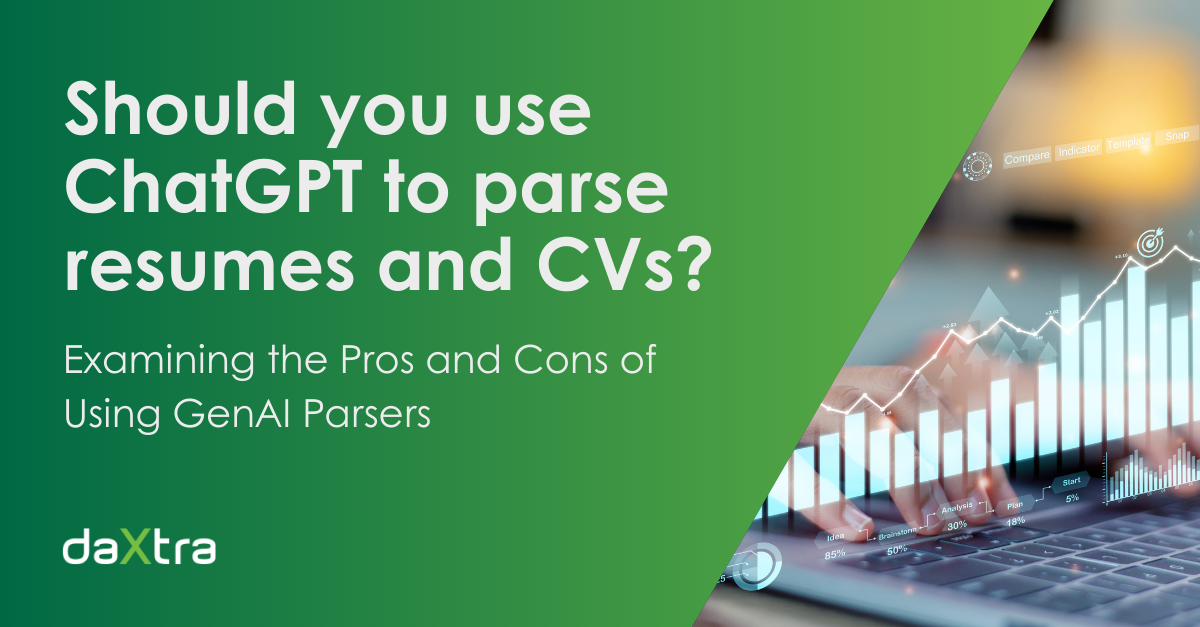Examining the pros and cons of using GenAI parsers
By Colleen Barraclough, VP of Customer Success

AI-driven tools are revolutionizing how staffing agencies and in-house recruiting teams handle resumes. AI has changed the game, and there are an overwhelming number of options available - from specialized, integrated solutions to one-off tools and freely available online tools like ChatGPT.
With free online tools becoming more ubiquitous, recruiting teams may wonder if ChatGPT and other free online generative AI tools can be used to parse resumes. Many of those tools can be used for parsing, but the question is: is ChatGPT a trustworthy and reliable tool for parsing resumes at scale?
This article will examine why choosing your resume parser with care is important. We’ll break down the pros and cons of using a tool like ChatGPT, and explore reasons why specialized tools can give recruiters a competitive edge in a dynamic market.
Resume Parsing with ChatGPT: Pros and Cons
Let's start by looking at the allure of ChatGPT. It's a versatile tool that has reached astronomical levels of popularity across every industry. It writes emails and has even replaced Google search for some users, but can it keep up with high-volume resume parsing? Let’s examine the pros and cons of using ChatGPT for this recruiting task.
Pro: Budget-Friendly
For recruiting operations with smart technical teams, setting up parsing with ChatGPT could be more cost-effective upfront. But, with OpenAI’s shift from nonprofit to for-profit, licensing fees or other costs may catch up eventually. Plus, there are costs associated with engineering your support for ChatGPT - if the API changes and throws a wrench into your tech stack, your team will need resources to monitor and troubleshoot the issue.
Pro: Customization Options
You can train ChatGPT on your company’s resume preferences with the right coding wizardry. Do you want it to focus on candidates who list "juggling" as a skill? Go for it!
Pro: Jack-of-All-Trades
ChatGPT can handle various data types with relative speed.
Con: Master of None
The adage rings true: when it comes to deciphering the nuances of resumes across industries, ChatGPT can miss the mark.
Con: Time and Resource-intensive
Training a large language model is no easy task - it can take precise engineering and trial and error before you get it right. With a constantly evolving market, you could be stuck playing catch up to get ChatGPT up to speed.
Con: Privacy and Compliance
Because ChatGPT is a large language model, it’s continuously learning, and your prompts could be used to train the model. In 2023, Samsung employees accidentally leaked confidential information by using ChatGPT, leading the company to ban the tool and competing LLMs from Google and Microsoft. In an era where data privacy is crucial (especially with legislation like GDPR), using ChatGPT could become a risky calculation without setting up stringent guardrails.
In fact, check your company’s AI policies before jumping in - several have strict guidelines or have banned its use altogether.
Resume Parsing with Specialized Tools: Solutions at Scale
Another option for resume parsing technology is partnering with a specialized provider (yes, like Daxtra). These providers offer more customized solutions, integrate into your tech stack, and parse high volumes of resumes at scale. Here are some areas where specialized parsing tools best ChatGPT and other genAI tools.
More Accurate
Specialized tools are often built with recruiters in mind, leading to more tailored and more accurate parsing for resumes. In comparison, ChatGPT or other genAI parsing is only as good as the prompt it’s given - sometimes that works great, but for complicated resumes or operations at scale it may not perform as well. For example, Daxtra’s algorithms have been trained on resumes for over twenty years, when we first began parsing resumes. Because of the time and depth of that training, parsing algorithms can distinguish details in resumes in different languages with great accuracy. Plus, parsers like Daxtra’s can also recognize the context of a resume and thus can distinguish between someone who uses Microsoft Office and someone who worked at the Microsoft office as an employee.
Better Data Privacy and Security
Established, specialized providers are already familiar with data privacy regulations, which means you don’t have to worry about the legality or security of running candidate data through them. Many tools (including Daxtra) are ISO 27001 certified, meaning they maintain an international standard of data security.

Improved Tech Workflows
Specialized tools can go beyond parsing to improve your entire recruitment process. From your application process to customized skill extraction, to job-matching algorithms, we've got it all. And the best part? It all plugs into your existing ATS. Or if you’ve got something special in mind – you can harness Daxtra power via supported APIs (unlike ChatGPT or other genAI APIs, which don’t provide setup help or ongoing support to maintain your integration.) For example, Daxtra’s dedicated support, product, and customer success managers take customer feedback very seriously and ensure that specialized solutions continue to evolve to keep up with the ever-changing recruiting industry.
Final Thoughts: ChatGPT vs. Specialized Resume Parsers
Both tools have their merits - ChatGPT and similar genAI models are quick, entry-level solutions that can work well for a handful of resumes. But for teams that process more than a few resumes, the advantages of a specialized resume parser are likely worth the upgrade - if not for speed and cost, then for the data compliance and tech support typically offered.
Think of it like deciding between a Swiss Army knife and a professional chef’s knife – both have their uses, but one is clearly designed for the kitchen.
Want to learn more about how recruiters are leveraging GenAI? Check out our Recruiters Guide to LLMs and GenAI, or get in touch with our team to learn how Daxtra is leveraging AI to humanize recruiting.



